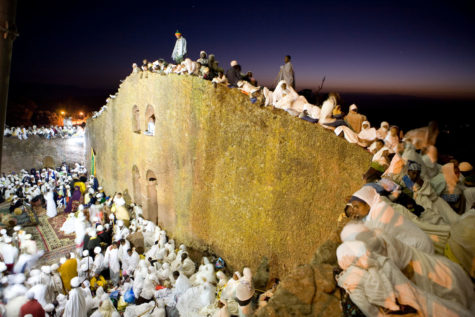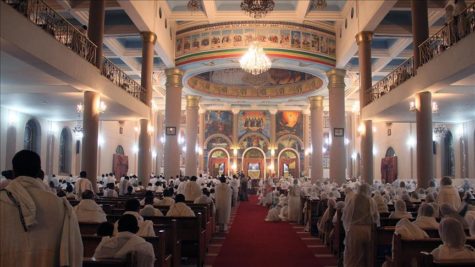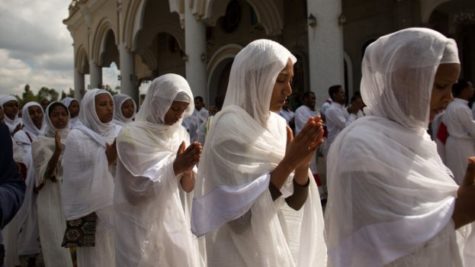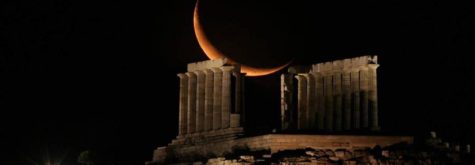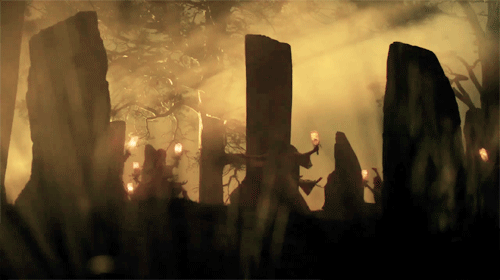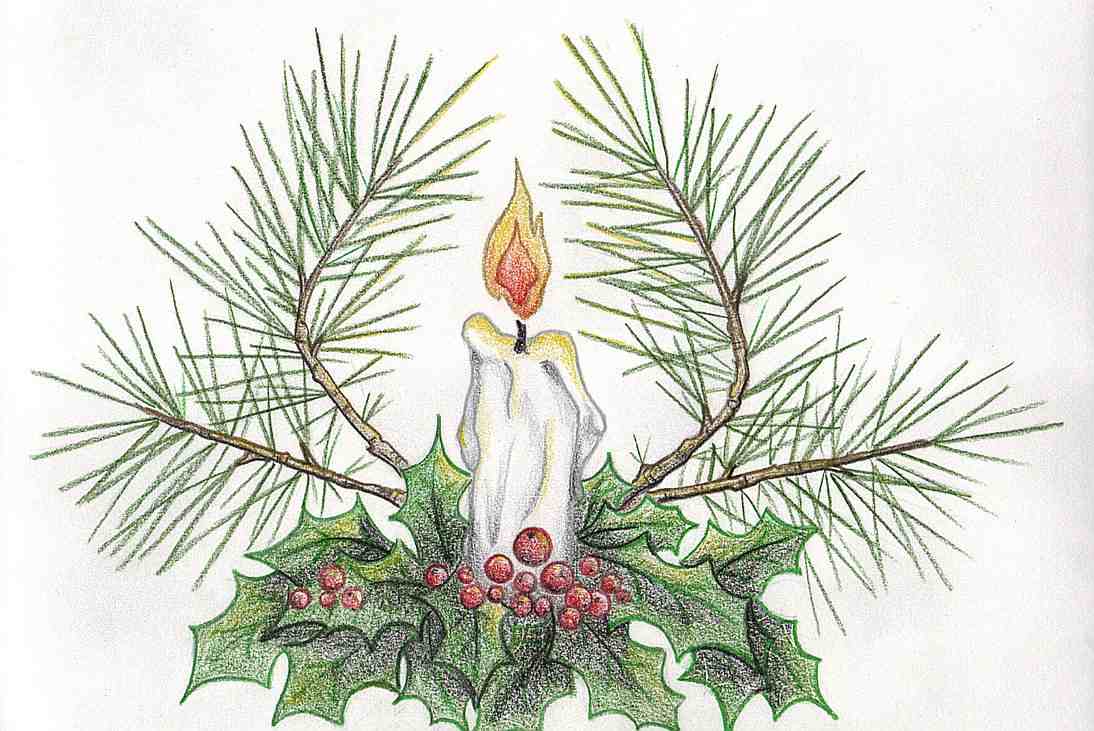Daily Archives: January 7, 2019
Ethiopia follows the Ethiopian calendar, consequently Christmas or Genna ((also known as Lidet, or “birthday”) falls on January 7th,
Like most other Christian holidays, Christmas in Ethiopia, is celebrated in its own unique way. The main ceremonial activities of the holiday center around local Ethiopian Orthodox churches (though Protestants and Catholics also celebrate), which hold late-night services on Christmas Eve lasting well past midnight.
People dress in white and attend church. Everyone receives a candle as they enter the church. The candles are lit, and everyone walks around the church three times. People stand during mass. Males and females are separated.
Traditional liturgical singing marks these services, as does chanting performed by priests and deacons wearing colorful robes with gold and silver accents. Many people travel by foot from church to church, taking in various services until the light of dawn announces the arrival of Christmas morning.
The first Christmas meal is often an early breakfast, eaten by bleary-eyed congregants after returning home. The light meal likely starts with juice made from flaxseed (to oil up the intestines after 40 days of fasting) before moving on to the famously spicy chicken stew doro wot, and it most certainly includes appropriately strong Ethiopian coffee to help welcome the new day.
Later on, friends and relatives gather to enjoy a full Genna feast, usually involving a freshly killed lamb for mutton tibs and traditional beverages such as tej (honey wine). And though gift-giving does not figure very prominently in the Ethiopian Christmas tradition, the purchase of new clothing for the occasion — particularly for children — is seen as an important part of the festivities.
Several hundred families walking toward churches dressed as a sea of brilliant white cotton is a common sight throughout the country.
Perhaps the most unique aspect of the Ethiopian Christmas tradition is that it is associated with a sport, also called Genna, that is most widely played during the holiday season. According to Ethiopian legend, when the shepherds of the biblical Christmas story were informed of the birth of the Messiah, they expressed their overwhelming joy by using their staffs to break into a spontaneous game that resembles field hockey. The afternoon of Genna is filled with matches of the game, played mainly by young men, and potentially other sporting activities such as horse racing.
Although Genna is observed by Christians across Ethiopia, the most famous Christmas celebrations arguably occur in the historic city of Lalibela. There, crowds of up to 100,000 pilgrims flock to watch immaculately dressed Orthodox clergy perform the woreb lining the steep ledges surrounding the famous rock-hewn churches, carved over 800 years ago.
Accompanied by a slowly building tempo of traditional church drums, metallic sistrum and pilgrims’ clapping, they lead the crowd in an intensely moving musical performance about the birth of Jesus Christ. For though its execution may look different here than in other parts of the world, the focus of Ethiopian Christmas remains the same: to celebrate the birth of a Savior who came to take away the sins of the world, and to bring peace to all mankind.
Sources:
The Noumenia is the first day of the visible New Moon and is held in honor of the household Gods. The Noumenia is also considered the second day in a three day household celebration held each lunar month – Hekate’s Deipnon is on the last day before the first slice of visible moon and is the last day in a lunar month, then the Noumenia which marks the first day in a lunar month, followed by the Agathos Daimon (Good Spirit) on the second day of the Lunar month.
The Noumenia is a celebration of the start of a new Hellenic month and seeks blessings for the household. Offerings such as incense or honey cakes are made to your household Gods at your family altar.
- Here’s a recipe for Ancient Hellenic Honey Cakes.
Traditionally, the household Gods consist of Hestia, Zeus Ktesios, Hermes, Hekate, Apollon Agyieus, your household’s Agathos Diamons and can include any ancestors you honor. However, many Hellenic Polytheists do honor more Gods at their family altar.
You can celebrate the Noumenia with the following rituals:
- Decorate their home with fresh flowers, evergreen branches, or other seasonal decorations.
- Serve a big family meal and eat it at the dining room table.
- Create a list of family goals or projects to get done or start within the next lunar month.
- Bake a special dessert that you only make on this day – such as Honey Cake.
- Like the ancient Athenians, you can burn frankincense and read the Orphic and Homeric hymns to Selēnē.
- Replace the ingredients in the Kadiskos (see below) with fresh water, oil, and fruit, and bits of food.
The Kadiskos is a small jar containing food stuffs that we receive from the Gods and give back in reciprocity. Refreshing the Kadiskos is part of preparing for Noumenia. Here are directions for Making a Kadiskos.
Hellenic Worship:
Hellenic worship makes notice of the New Moon, because it marks the beginning of the month, rather than the more obvious full moon, although many Hellenic festivals are held during or near the time of the full moon.
“The first day of the month was new moon day (noumēnia), recognized as a holy day throughout the Greek world. It was so holy that at Athens, no other festival ever took place that day. It was celebrated by a public ritual on the Acropolis and by private offerings of frankincense to statues of the gods.”
Herodotus says that, in Sparta, meat, barley meal and wine were distributed to the citizens by the Kings on the Noumenia.
Hymn To Selene
Orphic Hymn 9 to Selene says that she “Delights in stillness and in the kindly, auspicious night.” Many of the Orphic hymns, and this one especially, reminds us that the arrival and passage of each new month is a reflection of the cycle of lives, with birth following the period of dark death. So as She is “a sure token and a sign to mortal men,” so we can trust in the cycle of rebirth and renewal.
Orphic Hymn 9 ~
Fumigation from Aromatics
Hear, goddess queen (thea basileia), diffusing silver light, bull-horned, and wandering through the gloom of night.
With stars surrounded, and with circuit wide night’s torch extending, through the heavens you ride: female and male, with silvery rays you shine, and now full-orbed, now tending to decline.
Mother of ages, fruit-producing Mene (Moon), whose amber orb makes night’s reflected noon: lover of horses, splendid queen of night, all-seeing power, bedecked with starry light, lover of vigilance, the foe of strife, in peace rejoicing, and a prudent life: fair lamp of night, its ornament and friend, who givest to nature’s works their destined end.
Queen of the stars, all-wise Goddess, hail! Decked with a graceful robe and amble veil.
Come, blessed Goddess, prudent, starry, bright, come, moony-lamp, with chaste and splendid light, shine on these sacred rites with prosperous rays, and pleased accept thy suppliants’ mystic praise.
More Hymns, Prayers, and Invocations can be found at Widdershins.
A Prayer For The Noumenia
In honor of the Noumenia of Anthesterion:
I have seen the moon
thin curved glow
hovering on delicate breeze
divine above the pink horizon
gentle horns pointing
toward tomorrow
We are all re-born now
owning no past
Yesterday is cleansed
complete
Greetings to you,
Goddess!
Guide us around
the next cycle of life
until we meet again
May we use it wisely
~ by Melissa
Source: Hellenion.org
